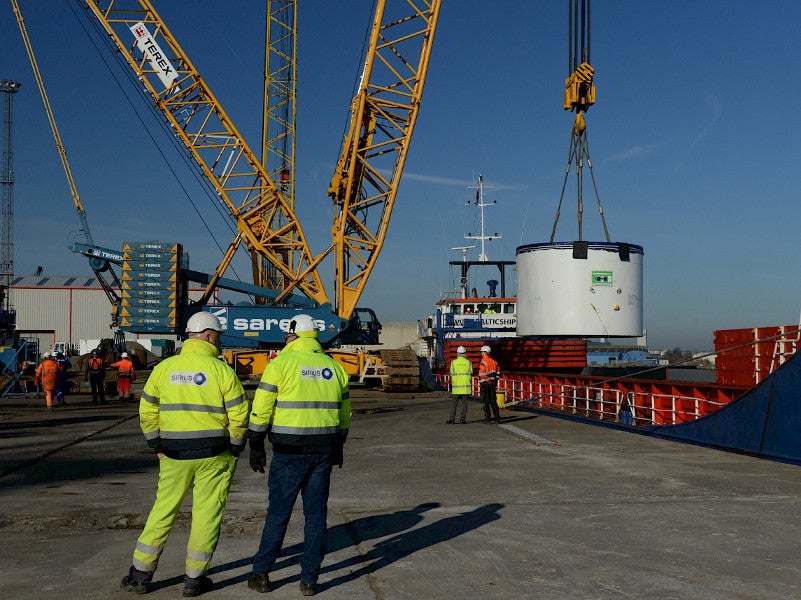The Woodsmith potash mine near Whitby, North Yorkshire, England, is set to be the world’s biggest and highest-grade polyhalite project.
Sirius Minerals owns the £3.2bn ($4.19bn) project under the subsidiary trading name of York Potash. The mine is anticipated to reach a production capacity of 13 million tons per annum (Mtpa) in 2026 and 20Mtpa by 2029.
Definitive feasibility study (DFS) of the project was completed in March 2016, while construction was commenced in May 2017. First production from the mine is expected in 2021, followed by ramping up to 10Mtpa in 2024.
With estimated resources of 2.66 billion tons, the project is also the deepest mine in Europe. It is expected to create 4500 direct and indirect jobs.
Woodsmith potash mine ore reserves
The proven and probable ore reserves at the Woodsmith potash mine are estimated to be 280Mt, as of March 2018.
Mining at Woodsmith potash mine
Simple conventional bulk mining method will be applied at the Woodsmith potash project.
Ore will be excavated by continuous mining machines and transported by either shuttle car or a continuous haulage system to the feeder breaker. The material size will be reduced to 150mm and delivered to the shaft bottom area, which will be further transferred to the underground storage bunkers before the start of skip loading at the shaft.
The polyhalite shelf of the project is proposed to be accessed by using two deep shafts, one for production and the other for service. With a depth of 1,594m, the production shaft will be capable of hoisting 6.7Mtpa, which will further increased to 13.4Mtpa.
The service shaft will have a 6.75m internal diameter and will be deeper than the production shaft, at 1,565m.
The processing plant is expected to process 7Mtpa of granulated and 3Mtpa of coarse product during the first phase of development. It is expected to have an overall processing capacity of up to 20Mtpa of granulated product.
Polyhalite transportation from the Woodsmith potash mine
A 23-mile (37km)-long and 4.9m-wide mineral transport system (MTS) tunnel will be used to transport the mined polyhalite to the materials handling facility (MHF) at Teesside. A 1,800t tunnel boring machine is being used to construct the MHF.
Polyhalite will be transported by using a conveyor belt, which will have a capacity of 20Mtpa.
The MHF in Teesside at Wilton International will feature the processing plant and other equipment required to granulate the polyhalite and produce POLY4.
Ore from the tunnel conveyor will be delivered to the surge bin, crushed, milled, and then forwarded to the screening facility.
At the screening facility, oversized ore will be separated and sent back for further crushing, while the remaining ore will be forwarded to the granulation area for conversion into pellets followed by drying.
The final product will be covered and transported via conveyor bridges to the Redcar Bulk Terminal for export to customers.
To accommodate the increased production, the project also proposes to construct two berths at Bran Sands, which will be capable of handling high-capacity Panamax ships and other required ship-loading equipment.
The material transportation tunnel will include maintenance rail and a 66kV power feeder service from Wilton International industrial complex.
Off-take agreements
In April 2019, Sirius signed a ten-year supply and distribution agreement with BayWa Agri Supply & Trade for the distribution of POLY4 in Europe.
An off-take agreement was signed with Archer Daniels Midland Company (ADM), in July 2018, for the supply of binder for the first five years of production. The contract also calls for the support and expertise of ADM with regard to the design and construction of a binder handling facility in Teesside.
Sirius signed ten-year agreements with Eiliseng and YSA for the supply of 1.2Mtpa and 800,000tpa respectively of POLY4, in July 2018.
A 2.5Mtpa POLY4 supply agreement was signed with Cibrafertil Companhia Brasileira de Fertilizantes in September 2018.
Project financing
Sirius secured £25m ($38.7m) in financing for the mining project from an institutional investor based in New York in August 2013.
It secured stage one financing of approximately $1.2bn in 2016 and reached a royalty financing agreement with Hancock British Holdings, a subsidiary of Hancock Prospecting, in October 2016.
Sirius proposes to raise £2.4bn ($3bn) senior debt financing in three tranches as part of the stage two financing.
Agreements entered with regard to the Woodsmith Mine
York Potash and Redcar Bulk Terminal entered a materials handling agreement, pursuant to which RBT will provide port and ship loading services from the Redcar Bulk Terminal for up to 10Mtpa.
York Potash Processing & Ports (YPPPL), a subsidiary of Sirius, entered a 30-year lease agreement with RBT for the land adjacent to the company’s existing port facilities. The leased land will be used to store the finished product.
Contractors involved
DMC Mining Services UK and DMC Mining Services were engaged for the design and construction of four shafts at the Woodsmith polyhalite project in North Yorkshire.
In February 2019, DMC Mining Services sub-contracted Francis Brown for the fabrication and welding of 50t of steel formwork. DMC also engaged William Hare for the manufacture of 3,000t of equipment, including steel headframes for the winding gear and the galloways.
YPPPL awarded the engineering, procurement, and construction contract (EPC) for the development of port handling facility at Teesside to McLaughlin & Harvey.
STRABAG was awarded the contract for the design and construction of the 37km-long MTS tunnel for the Woodsmith potash mine.
The EPC contract for the construction of MHF at Wilton was awarded to Jacobs Engineering Group, in September 2018.
North Midland Construction (NMCN) was awarded the highway and enabling works contract for the project, while Fugro Geoservices was engaged in October 2017 for providing geo-intelligence solutions.
Balfour Beatty was awarded the contract to perform improvements to Mayfield Road junction in Whitby as part of the improvements to Mayfield Road junction.






